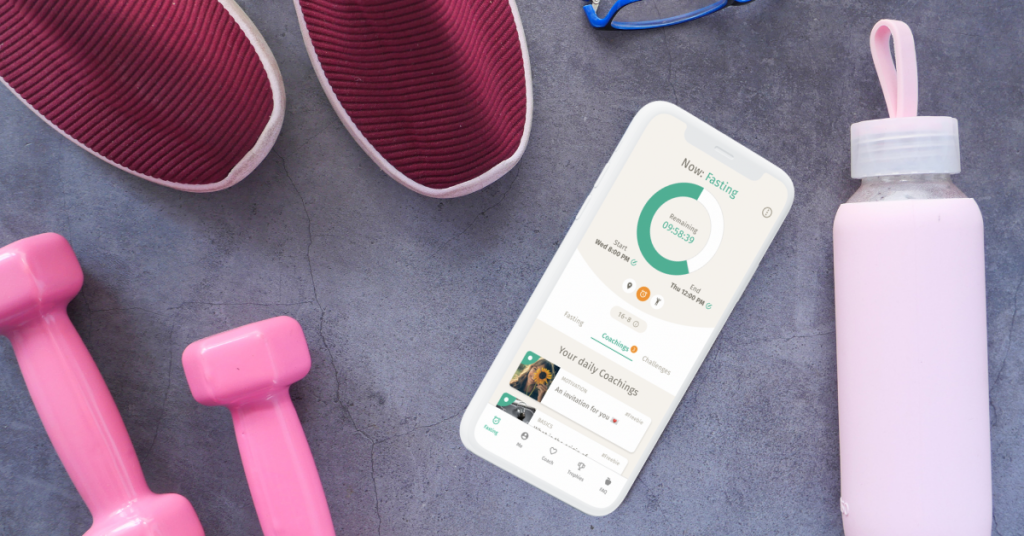Are you a fitness enthusiast or an athlete eager to optimize your workouts and achieve peak performance? If so, you’re likely familiar with the age-old debate: Is it better to work out while fasting or in your eating window? In this blog post, we’ll unveil the incredible benefits of both approaches and help you decide which one suits your active lifestyle best.
Fasting and Sports: Dream Couple or Toxic Relationship?
Fasting and sports may seem like an unlikely pairing, but when you delve into the science behind it, you’ll discover they can be a dynamic duo. Fasting can for example significantly enhance your athletic performance and overall fitness.
On the other hand, under certain circumstances it may be better to train in your eating window, depending on your goals.
With fasting and sports as your allies, let’s explore the advantages of working out in your eating and fasting windows.
Working Out in Your Fasting Period
1. Improved hormonal balance
Fasting triggers a cascade of hormonal changes that can benefit your workouts. It increases the release of growth hormone and norepinephrine, both of which support muscle growth and fat burning.
2. Enhanced insulin sensitivity
During fasting, your body becomes more sensitive to insulin. This means that when you eventually eat, your muscles are primed to absorb nutrients and fuel recovery more efficiently.
3. More effective muscle building/preservation
Fasting, especially when combined with resistance training, can promote muscle protein synthesis. This is essential for both building new muscle and preserving existing muscle mass.
4. Increased fat burning
Fasting empties the body’s glycogen stores. If you then exercise on top of that, the process is accelerated and your body can tap into its fat stores for energy, which is particularly advantageous if your goal is to shed some weight.
5. Increased performance
Surprisingly, many athletes find that they perform exceptionally well during fasted workouts. The mental clarity and heightened focus associated with fasting can enhance your workout performance.
Working Out in Your Eating Period
1. Improved workout recovery
Eating before your workout provides your body with readily available energy and nutrients. This can aid in faster recovery post-workout.
2. Enhanced energy availability
When you work out in your eating window, you have the advantage of a full tank of glycogen, which can fuel longer and more intense workouts.
3. Allows longer and more intense workouts
With sufficient pre-workout nutrition, you can push your limits and engage in extended, high-intensity training sessions without worrying about energy depletion. If you’re looking for some pre-workout snack inspiration feel free to check out our blog post about the topic.
When to Practice Which Forms of Physical Activity
When it comes to IF and sports, there is one golden rule that should always be respected: listening to your body.
Paying attention to how your body responds to different exercise timings and forms is essential for optimal results. Here’s a breakdown of the ideal activities for each period:
Fasting periods:
Engage in low to moderate-intensity exercises, such as walking, pilates or yoga. These activities are well-suited to fasting periods as they don’t require a high amount of immediate energy. Plus, by choosing these kinds of workouts you make sure not to expose your body to too much stress. Especially during longer periods of fasting (18 hours or more), it is important to avoid high-intensity activities.
If you’re looking for creative options for low- and mid-intensity activities, make sure to check out the activity challenges in the BodyFast app. These have been put together by our team of experts to fit your daily routine with intermittent fasting.
Eating periods:
Save high-intensity workouts, such as CrossFit, weight training, tabata or HIIT, for your eating periods. These demanding activities benefit from the energy and nutrients available in your post-meal state, ensuring adequate energy and muscle recovery.
Choosing the Right Approach for You
Still not sure about your perfect strategy? The decision between working out in your fasting period or during your eating window ultimately depends on your individual goals, preferences, and how your body responds. A mixed approach may also be appropriate in certain cases.
Here are some tips to help you decide:
- Fasting for fat loss: If your primary goal is fat loss, consider working out towards the end of your fasting period to maximize fat-burning benefits and focus on low to moderate-intensity workouts.
- Fasting for muscle gain: If you’re focused on building muscle, you may benefit from working out in your eating window to ensure you have sufficient energy and nutrients for muscle growth. Strength training is one of the most effective ways to help you gain muscle.
- Experiment and listen to your body: Everyone’s body responds differently. Experiment with both approaches and pay close attention to how you feel during and after workouts.
- Hydration is key: Regardless of when you work out, staying hydrated is crucial for optimal performance. Ensure you’re drinking enough water throughout your workout (and day in general). Isotonic drinks can also be a great choice in your eating window in order to keep your electrolyte levels in check.
This is How to Boost Your Fasting AND Fitness Success
In conclusion, whether you choose to work out while fasting or during your eating window, remember that consistency, and a tailored nutrition are key to achieving your IF and fitness goals. Ultimately, the best approach is the one that aligns with your unique lifestyle and helps you become the best version of yourself. So go ahead, embrace the fasting journey, let it supercharge your workouts, and lead you to new heights of fitness success!
Find the optimal fasting plan, delicious recipes tailored to your fasting lifestyle, supportive weekly tasks, daily motivational Coachings, and more in the BodyFast app.

